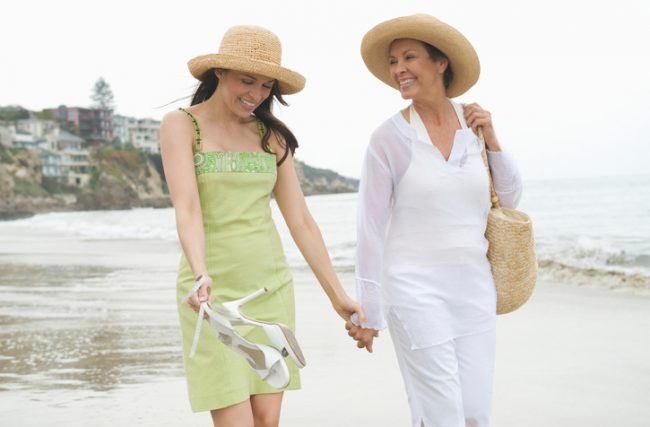There’s nothing like the relationship you have with your mother.
No matter if you two share an unshakable bond or you haven’t spoken in years; if she’s passed on or is living with you right upstairs: your mother gave you life. That alone creates an inextricable connection that lasts throughout your existence, often manifesting, for better or worse, in nearly every major domain of your life—including your overall health.
 And while you may have inherited a number of treasures from your mother—a penchant for being outdoors, her collection of timeworn recipes or her enviable cheekbones (thanks, Mom!)—you may have also inherited genetic predispositions and traits from her that are…less than wonderful. (As one of my friends puts it, “I love my mom. I just don’t love her thighs.”)
And while you may have inherited a number of treasures from your mother—a penchant for being outdoors, her collection of timeworn recipes or her enviable cheekbones (thanks, Mom!)—you may have also inherited genetic predispositions and traits from her that are…less than wonderful. (As one of my friends puts it, “I love my mom. I just don’t love her thighs.”)
And yet, how much is your well-being due to the fact that your mother nourished you for nine months in the womb—and how much of it is due to lifestyle choices and the genetic grab bag that is our DNA? In other words, how much of your mother's health is a prediction for your own destiny?
In honor of Mother’s Day, we’ve rounded up the primary ways your mother’s health impacts yours—and what you can do to achieve optimal well-being. Because isn’t that what she always wanted?
Morning sickness
Research suggests that there’s a substantial link between your mother’s morning sickness and, if you’re expecting, your own. “Studies have found a strong genetic link to this nauseating rite of passage, especially in severe cases,” What to Expect reports. To mitigate what very well may run in your family, eat smaller portions more frequently, stock up on easily digestible food (such as potatoes, soups and steamed vegetables) and reach for vitamin B supplements. These steps may naturally relieve the a.m. symptoms that can arrive when you’re carrying a little one of your own.
Gray hair
Happen to spot a silver strand? Take a look at your family photo album. New research demonstrates that gray hair is due less to environmental factors like stress, and more to genetics. (As Medical Daily puts it, “we tend to grow gray at the time either our parents or grandparents saw their first gray strand.”) But before you declare yourself doomed—or scout out those tweezers—know that environmental factors still have an impact on the hue of your hair. A healthy, nutrient-rich diet may help you maintain your natural hair color, while certain vitamin deficiencies may cause you to lose some of your pigment. If not? Two words: Helen Mirren.
Weight gain
Your mother may have had a terrific figure until her 50s when weight gain crept in—and the mere thought of it fills you with fear. But, while you may have a shape similar to hers—whether that be, say, an apple, a pear or athletic—realize that the fate of your weight is still within your jurisdiction. “Studies suggest that while your genes may determine up to 80 percent of your weight and body shape, environment and personal choice still play a significant role,” Women’s Health reports. Translation? Your mother might not have hit the gym, yoga mat, pool or pavement, but you can—just as you can choose healthy foods to work against the tide of genes and natural aging. As in, have that apple—but leave the pie.
Skin
You can blame your mom for a litany of things (hello, temper), but the state of your skin isn’t entirely attributed to your mother. The most important factors that determine the status of your complexion—smoking, sunbathing, stress—cannot be inherited. Indeed, great skin is multi-factorial. Your genes give you your base, but the way you treat (or mistreat) your skin influences its future. Quality, natural skincare products, sunscreen, diet, exercise—all work toward a radiant complexion, and all are within your command to control.
Neurodegenerative diseases, cancer, diabetes and heart disease
Certain genes can predispose us to neurodegenerative diseases such as Parkinson’s and Alzheimer's, as well as to certain cancers. (For example, a child whose biological mother or father carries a genetic mutation for early-onset familial Alzheimer’s disease has a 50/50 chance of inheriting that mutation, the National Institute on Aging reports.) Gene testing is an excellent way to drill down the details of your genetic story; based on the findings you receive, you can then make lifestyle and nutritional changes to support those genes.
If breast cancer runs in the family, look to Angelina Jolie—one of many women who, following genetic testing, elected to have her breasts, ovaries and fallopian tubes removed as a preemptive measure. Diabetes and heart disease (as well as osteoporosis and depression) have also been linked to genes; by knowing your risk factors, you can take active steps to potentially prevent these conditions from developing.
“You want to know both of your parents’ histories,” Health confirms, “but the links of these diseases are often stronger on the maternal side for a daughter,” says Dr. JoAnn Pinkerton, a professor of obstetrics and gynecology at the University of Virginia.
In short? Some of your genes most definitely come from your mother, and myriad lifestyle and environmental factors can turn on desirable or undesirable genes. Live naturally and mindfully, and chances are you can embrace the genetic gifts your mother gave you—and leave the rest of those family “traditions” behind.



